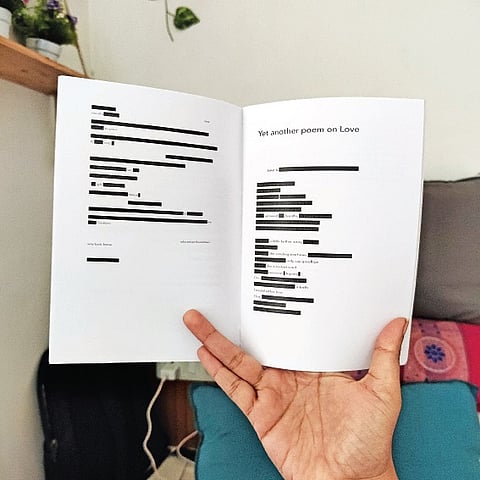

BENGALURU: Even among those of us who are avid readers, ready to get lost in words whenever we get the chance – there are many who find poetry intimidating to read, and even more so when it comes to writing it. Blackout poetry, a form of ‘found poetry’ involving blacking out sections of an existing text like a newspaper article or page from an old book to create a poem, is a fun activity that might just change your mind.
“One of the things that I hear often is ‘I can’t write poetry’. I use blackout poetry as an exercise to remove this anxiety – it unlocks something in the brain where you begin to see poetically. Something happens in that finding effort – It’s as if the poem is there, and if you are quiet, it will speak to you,” says Kala Krishnan Ramesh, poet and author of the Mahasena trilogy who teaches undergraduate creative writing students.
Noting students’ responses, she says, “They begin with confusion, thinking ‘How are we going to do this?’ And then, once they’ve done one or two practice ones, there’s a great deal of fun and lightness, and I don’t know anyone that hasn’t really enjoyed doing it.”
The process is a playful exercise for Jade, who frequently hosts blackout poetry workshops that are attended by writers and lay-persons alike. “The process is very playful – you can start with a newspaper or a page book and connect one interesting word to another,” she says. According to her, becoming aware of your emotions and letting them take the lead can help with getting started.
“Be mindful of how you’re feeling because that’ll influence the kind of words you will pay attention to – if I’m in a playful mood, I go for funny sounding words or phrases and make whimsical connections. If I’m in a serious mood, something more thought-provoking emerges,” she explains To push the limits of the form and make it more challenging, some enthusiasts set interesting restrictions for themselves.
“I usually choose a word or sentence to commit to as a title and then find other words that go along with the title. It’s also fun to experiment with the spaces in between the words you choose not to black out, and see how far you can go till it stops making sense,” shares Meenakshi Visvanathan, a young professional who uses the form to overcome writer’s block.
While formally published blackout poems are hard to come by due to copyright issues, some poets, like Svetlana Saraswat with her collection Blackou- (spelt deliberately), have self-published chapbooks. Sharing another way to elevate your blackout poem, she says, “You can, perhaps, use it as a literary tool to juxtapose meanings or to subvert the message of the original text – that would be an interesting use of the form that goes beyond just the attention-grabbing aesthetic of the medium. For me, when I decided to take it up, I just wanted a creative challenge and to have fun with my writing again.”